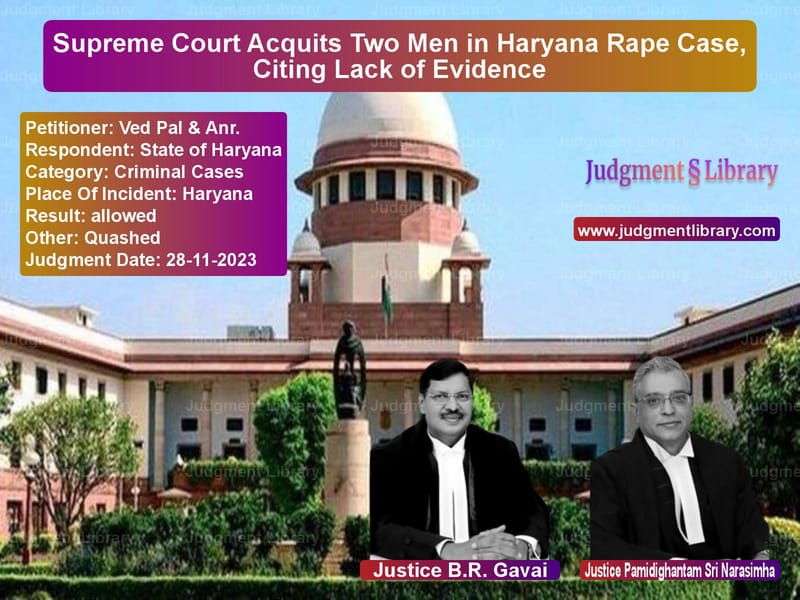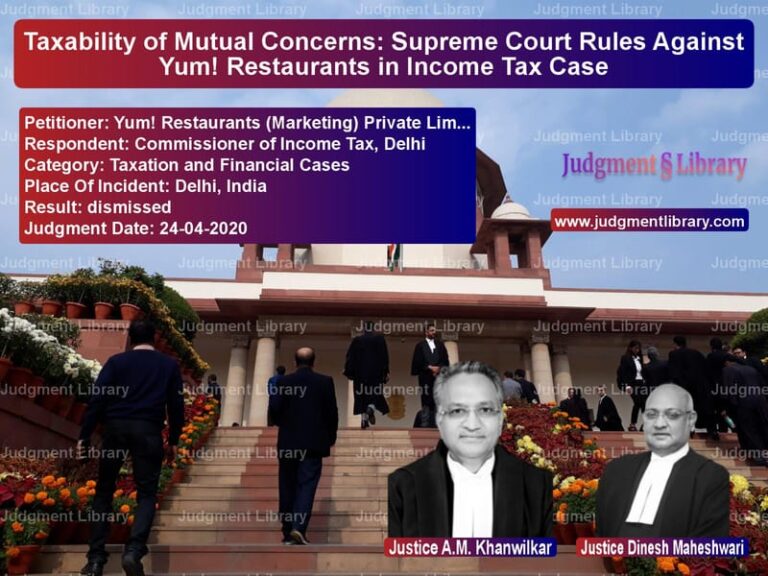Supreme Court Acquits Two Men in Haryana Rape Case, Citing Lack of Evidence
The Supreme Court of India recently ruled in Ved Pal & Anr. v. State of Haryana, acquitting two men accused of gang rape. The judgment overturned prior convictions by the trial court and the Punjab and Haryana High Court, citing lack of corroborative evidence, inconsistencies in witness testimonies, and failure of the prosecution to establish guilt beyond a reasonable doubt.
Background of the Case
The case involved the alleged gang rape of a minor girl in Haryana on the night of August 6, 2022. According to the prosecution, the victim, a ninth-grade student, was forcibly taken from her house by the accused, Ved Pal and Suresh, and raped at the house of one of the accused. The case was registered under:
- Section 376(2)(g) IPC (Gang Rape)
- Section 342 IPC (Wrongful Confinement)
- Section 34 IPC (Common Intention)
The trial court convicted the accused on January 28, 2004, sentencing them to 10 years of rigorous imprisonment and a fine of ₹2,000 each. The Punjab and Haryana High Court upheld this judgment on July 15, 2019, leading to an appeal before the Supreme Court.
Prosecution’s Case
The prosecution relied on the following key pieces of evidence:
- The testimony of the victim (P.W.1), who stated that she was abducted by the accused at night while her parents were sleeping.
- Her mother’s testimony (P.W.2), who claimed that she found her daughter distressed and immediately took her to the police station.
- A medical examination, which suggested the possibility of sexual intercourse.
- A forensic report indicating the presence of semen on the underwear of one of the accused.
The prosecution argued that the evidence was sufficient to prove the guilt of the accused beyond a reasonable doubt.
Defense’s Arguments
The defense challenged the prosecution’s case on multiple grounds:
- The alleged crime scene was three houses away from the victim’s home, making abduction implausible without raising an alarm.
- There were no injuries on the victim, raising doubts about the use of force.
- The victim’s statement contained several inconsistencies, such as contradictory accounts of whether she shouted for help.
- The forensic report was inconclusive as no semen was found on the victim or her clothes.
- There was an ongoing civil property dispute between the families, suggesting the possibility of a false case.
Supreme Court’s Analysis
1. Reliability of the Victim’s Testimony
The Court reiterated that a rape conviction can be based solely on the testimony of the victim, provided it is cogent, reliable, and consistent. However, in this case, the Court found the victim’s testimony contradictory and unconvincing. It stated:
“A conviction under Section 376 IPC can be sustained on the sole testimony of the prosecutrix if it inspires confidence. However, where the evidence is inconsistent and improbable, the accused must be given the benefit of the doubt.”
2. Lack of Medical Corroboration
The medical examination report did not confirm any signs of rape. The forensic report also failed to establish a direct link between the accused and the crime. The Court observed:
“The absence of medical evidence supporting the allegations, coupled with contradictory witness statements, raises serious doubts about the prosecution’s version of events.”
3. Delay in Filing the FIR
The FIR was lodged seven hours after the alleged incident, during which time the victim had the opportunity to discuss the case with her family. The Court found that:
“The delay in filing the FIR, though not always fatal, requires the court to scrutinize the prosecution’s case with greater caution.”
4. Civil Dispute Between Families
The Court noted that the accused and the victim’s family were involved in a civil property dispute. While a prior dispute does not automatically invalidate a complaint, the Court held that:
“When coupled with weak evidence, a prior enmity between families cannot be ignored as a possible motive for false implication.”
Final Judgment
Based on the analysis, the Supreme Court:
- Quashed the convictions of Ved Pal and Suresh.
- Ordered their immediate release unless required in another case.
- Reiterated the principle that courts must be cautious in convicting solely based on inconsistent testimony.
Conclusion
This judgment underscores key legal principles:
- The necessity of corroborative evidence in serious criminal cases.
- The role of medical and forensic evidence in establishing guilt.
- The importance of distinguishing between genuine cases and possible false implications.
The ruling reinforces that while courts must take sexual assault allegations seriously, they must also ensure that convictions are based on clear, consistent, and reliable evidence.
Petitioner Name: Ved Pal & Anr..Respondent Name: State of Haryana.Judgment By: Justice B.R. Gavai, Justice Pamidighantam Sri Narasimha.Place Of Incident: Haryana.Judgment Date: 28-11-2023.
Don’t miss out on the full details! Download the complete judgment in PDF format below and gain valuable insights instantly!
Download Judgment: ved-pal-&-anr.-vs-state-of-haryana-supreme-court-of-india-judgment-dated-28-11-2023.pdf
Directly Download Judgment: Directly download this Judgment
See all petitions in Rape Cases
See all petitions in Bail and Anticipatory Bail
See all petitions in Fraud and Forgery
See all petitions in Custodial Deaths and Police Misconduct
See all petitions in Attempt to Murder Cases
See all petitions in Judgment by B R Gavai
See all petitions in Judgment by P.S. Narasimha
See all petitions in allowed
See all petitions in Quashed
See all petitions in supreme court of India judgments November 2023
See all petitions in 2023 judgments
See all posts in Criminal Cases Category
See all allowed petitions in Criminal Cases Category
See all Dismissed petitions in Criminal Cases Category
See all partially allowed petitions in Criminal Cases Category







